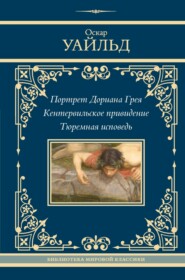По всем вопросам обращайтесь на: info@litportal.ru
(©) 2003-2025.
✖
Lord Arthur Savile's Crime; The Portrait of Mr. W.H., and Other Stories
Настройки чтения
Размер шрифта
Высота строк
Поля
To what it works in, like the dyer’s hand:
Pity me then and wish I were renew’d —
and there are many signs elsewhere of the same feeling, signs familiar to all real students of Shakespeare.
One point puzzled me immensely as I read the Sonnets, and it was days before I struck on the true interpretation, which indeed Cyril Graham himself seems to have missed. I could not understand how it was that Shakespeare set so high a value on his young friend marrying. He himself had married young, and the result had been unhappiness, and it was not likely that he would have asked Willie Hughes to commit the same error. The boy-player of Rosalind had nothing to gain from marriage, or from the passions of real life. The early sonnets, with their strange entreaties to have children, seemed to me a jarring note. The explanation of the mystery came on me quite suddenly, and I found it in the curious dedication. It will be remembered that the dedication runs as follows: —
TO THE ONLIE BEGETTER OF
THESE INSUING SONNETS
MR. W. H. ALL HAPPINESSE
AND THAT ETERNITIE
PROMISED
BY
OUR EVER-LIVING POET
WISHETH
THE WELL-WISHING
ADVENTURER IN
SETTING
FORTH
T. T.
Some scholars have supposed that the word ‘begetter’ in this dedication means simply the procurer of the Sonnets for Thomas Thorpe the publisher; but this view is now generally abandoned, and the highest authorities are quite agreed that it is to be taken in the sense of inspirer, the metaphor being drawn from the analogy of physical life. Now I saw that the same metaphor was used by Shakespeare himself all through the poems, and this set me on the right track. Finally I made my great discovery. The marriage that Shakespeare proposes for Willie Hughes is the marriage with his Muse, an expression which is definitely put forward in the 82nd Sonnet, where, in the bitterness of his heart at the defection of the boy-actor for whom he had written his greatest parts, and whose beauty had indeed suggested them, he opens his complaint by saying —
I grant thou wert not married to my Muse.
The children he begs him to beget are no children of flesh and blood, but more immortal children of undying fame. The whole cycle of the early sonnets is simply Shakespeare’s invitation to Willie Hughes to go upon the stage and become a player. How barren and profitless a thing, he says, is this beauty of yours if it be not used: —
When forty winters shall besiege thy brow
And dig deep trenches in thy beauty’s field,
Thy youth’s proud livery, so gazed on now,
Will be a tatter’d weed, of small worth held:
Then being ask’d where all thy beauty lies,
Where all the treasure of thy lusty days,
To say, within thine own deep-sunken eyes,
Were an all-eating shame and thriftless praise.
You must create something in art: my verse ‘is thine, and born of thee’; only listen to me, and I will ‘bring forth eternal numbers to outlive long date,’ and you shall people with forms of your own image the imaginary world of the stage. These children that you beget, he continues, will not wither away, as mortal children do, but you shall live in them and in my plays: do but —
Make thee another self, for love of me,
That beauty still may live in thine or thee.
I collected all the passages that seemed to me to corroborate this view, and they produced a strong impression on me, and showed me how complete Cyril Graham’s theory really was. I also saw that it was quite easy to separate those lines in which he speaks of the Sonnets themselves from those in which he speaks of his great dramatic work. This was a point that had been entirely overlooked by all critics up to Cyril Graham’s day. And yet it was one of the most important points in the whole series of poems. To the Sonnets Shakespeare was more or less indifferent. He did not wish to rest his fame on them. They were to him his ‘slight Muse,’ as he calls them, and intended, as Meres tells us, for private circulation only among a few, a very few, friends. Upon the other hand he was extremely conscious of the high artistic value of his plays, and shows a noble self-reliance upon his dramatic genius. When he says to Willie Hughes:
But thy eternal summer shall not fade,
Nor lose possession of that fair thou owest;
Nor shall Death brag thou wander’st in his shade,
When in eternal lines to time thou grow’st:
So long as men can breathe, or eyes can see,
So long lives this, and this gives life to thee; —
the expression ‘eternal lines’ clearly alludes to one of his plays that he was sending him at the time, just as the concluding couplet points to his confidence in the probability of his plays being always acted. In his address to the Dramatic Muse (Sonnets C. and CI.), we find the same feeling.
Where art thou, Muse, that thou forget’st so long
To speak of that which gives thee all thy might?
Spend’st thou thy fury on some worthless song,
Darkening thy power to lend base subjects light?
he cries, and he then proceeds to reproach the Mistress of Tragedy and Comedy for her ‘neglect of Truth in Beauty dyed,’ and says —
Because he needs no praise, wilt thou be dumb?
Excuse not silence so, for ‘t lies in thee
To make him much outlive a gilded tomb
And to be praised of ages yet to be.
Then do thy office, Muse; I teach thee how
To make him seem long hence as he shows now.
It is, however, perhaps in the 55th Sonnet that Shakespeare gives to this idea its fullest expression. To imagine that the ‘powerful rhyme’ of the second line refers to the sonnet itself, is to mistake Shakespeare’s meaning entirely. It seemed to me that it was extremely likely, from the general character of the sonnet, that a particular play was meant, and that the play was none other but Romeo and Juliet.
Not marble, nor the gilded monuments
Of princes, shall outlive this powerful rhyme;
But you shall shine more bright in these contents
Than unswept stone besmear’d with sluttish time.
When wasteful wars shall statues overturn,
And broils root out the work of masonry,
Nor Mars his sword nor war’s quick fire shall burn
The living record of your memory.
‘Gainst death and all-oblivious enmity
Shall you pace forth; your praise shall still find room
Even in the eyes of all posterity
That wear this world out to the ending doom.
So, till the judgement that yourself arise,
You live in this, and dwell in lovers’ eyes.
It was also extremely suggestive to note how here as elsewhere Shakespeare promised Willie Hughes immortality in a form that appealed to men’s eyes – that is to say, in a spectacular form, in a play that is to be looked at.
For two weeks I worked hard at the Sonnets, hardly ever going out, and refusing all invitations. Every day I seemed to be discovering something new, and Willie Hughes became to me a kind of spiritual presence, an ever-dominant personality. I could almost fancy that I saw him standing in the shadow of my room, so well had Shakespeare drawn him, with his golden hair, his tender flower-like grace, his dreamy deep-sunken eyes, his delicate mobile limbs, and his white lily hands. His very name fascinated me. Willie Hughes! Willie Hughes! How musically it sounded! Yes; who else but he could have been the master-mistress of Shakespeare’s passion, [1 - Sonnet xx. 2.] the lord of his love to whom he was bound in vassalage, [2 - Sonnet xxvi. 1.] the delicate minion of pleasure, [3 - Sonnet cxxvi. 9.] the rose of the whole world, [4 - Sonnet cix. 14.] the herald of the spring [5 - Sonnet i. 10.] decked in the proud livery of youth, [6 - Sonnet ii. 3.] the lovely boy whom it was sweet music to hear, [7 - Sonnet viii. 1.] and whose beauty was the very raiment of Shakespeare’s heart, [8 - Sonnet xxii. 6.] as it was the keystone of his dramatic power? How bitter now seemed the whole tragedy of his desertion and his shame! – shame that he made sweet and lovely [9 - Sonnet xcv. 1.] by the mere magic of his personality, but that was none the less shame. Yet as Shakespeare forgave him, should not we forgive him also? I did not care to pry into the mystery of his sin.
His abandonment of Shakespeare’s theatre was a different matter, and I investigated it at great length. Finally I came to the conclusion that Cyril Graham had been wrong in regarding the rival dramatist of the 80th Sonnet as Chapman. It was obviously Marlowe who was alluded to. At the time the Sonnets were written, such an expression as ‘the proud full sail of his great verse’ could not have been used of Chapman’s work, however applicable it might have been to the style of his later Jacobean plays. No: Marlowe was clearly the rival dramatist of whom Shakespeare spoke in such laudatory terms; and that
Pity me then and wish I were renew’d —
and there are many signs elsewhere of the same feeling, signs familiar to all real students of Shakespeare.
One point puzzled me immensely as I read the Sonnets, and it was days before I struck on the true interpretation, which indeed Cyril Graham himself seems to have missed. I could not understand how it was that Shakespeare set so high a value on his young friend marrying. He himself had married young, and the result had been unhappiness, and it was not likely that he would have asked Willie Hughes to commit the same error. The boy-player of Rosalind had nothing to gain from marriage, or from the passions of real life. The early sonnets, with their strange entreaties to have children, seemed to me a jarring note. The explanation of the mystery came on me quite suddenly, and I found it in the curious dedication. It will be remembered that the dedication runs as follows: —
TO THE ONLIE BEGETTER OF
THESE INSUING SONNETS
MR. W. H. ALL HAPPINESSE
AND THAT ETERNITIE
PROMISED
BY
OUR EVER-LIVING POET
WISHETH
THE WELL-WISHING
ADVENTURER IN
SETTING
FORTH
T. T.
Some scholars have supposed that the word ‘begetter’ in this dedication means simply the procurer of the Sonnets for Thomas Thorpe the publisher; but this view is now generally abandoned, and the highest authorities are quite agreed that it is to be taken in the sense of inspirer, the metaphor being drawn from the analogy of physical life. Now I saw that the same metaphor was used by Shakespeare himself all through the poems, and this set me on the right track. Finally I made my great discovery. The marriage that Shakespeare proposes for Willie Hughes is the marriage with his Muse, an expression which is definitely put forward in the 82nd Sonnet, where, in the bitterness of his heart at the defection of the boy-actor for whom he had written his greatest parts, and whose beauty had indeed suggested them, he opens his complaint by saying —
I grant thou wert not married to my Muse.
The children he begs him to beget are no children of flesh and blood, but more immortal children of undying fame. The whole cycle of the early sonnets is simply Shakespeare’s invitation to Willie Hughes to go upon the stage and become a player. How barren and profitless a thing, he says, is this beauty of yours if it be not used: —
When forty winters shall besiege thy brow
And dig deep trenches in thy beauty’s field,
Thy youth’s proud livery, so gazed on now,
Will be a tatter’d weed, of small worth held:
Then being ask’d where all thy beauty lies,
Where all the treasure of thy lusty days,
To say, within thine own deep-sunken eyes,
Were an all-eating shame and thriftless praise.
You must create something in art: my verse ‘is thine, and born of thee’; only listen to me, and I will ‘bring forth eternal numbers to outlive long date,’ and you shall people with forms of your own image the imaginary world of the stage. These children that you beget, he continues, will not wither away, as mortal children do, but you shall live in them and in my plays: do but —
Make thee another self, for love of me,
That beauty still may live in thine or thee.
I collected all the passages that seemed to me to corroborate this view, and they produced a strong impression on me, and showed me how complete Cyril Graham’s theory really was. I also saw that it was quite easy to separate those lines in which he speaks of the Sonnets themselves from those in which he speaks of his great dramatic work. This was a point that had been entirely overlooked by all critics up to Cyril Graham’s day. And yet it was one of the most important points in the whole series of poems. To the Sonnets Shakespeare was more or less indifferent. He did not wish to rest his fame on them. They were to him his ‘slight Muse,’ as he calls them, and intended, as Meres tells us, for private circulation only among a few, a very few, friends. Upon the other hand he was extremely conscious of the high artistic value of his plays, and shows a noble self-reliance upon his dramatic genius. When he says to Willie Hughes:
But thy eternal summer shall not fade,
Nor lose possession of that fair thou owest;
Nor shall Death brag thou wander’st in his shade,
When in eternal lines to time thou grow’st:
So long as men can breathe, or eyes can see,
So long lives this, and this gives life to thee; —
the expression ‘eternal lines’ clearly alludes to one of his plays that he was sending him at the time, just as the concluding couplet points to his confidence in the probability of his plays being always acted. In his address to the Dramatic Muse (Sonnets C. and CI.), we find the same feeling.
Where art thou, Muse, that thou forget’st so long
To speak of that which gives thee all thy might?
Spend’st thou thy fury on some worthless song,
Darkening thy power to lend base subjects light?
he cries, and he then proceeds to reproach the Mistress of Tragedy and Comedy for her ‘neglect of Truth in Beauty dyed,’ and says —
Because he needs no praise, wilt thou be dumb?
Excuse not silence so, for ‘t lies in thee
To make him much outlive a gilded tomb
And to be praised of ages yet to be.
Then do thy office, Muse; I teach thee how
To make him seem long hence as he shows now.
It is, however, perhaps in the 55th Sonnet that Shakespeare gives to this idea its fullest expression. To imagine that the ‘powerful rhyme’ of the second line refers to the sonnet itself, is to mistake Shakespeare’s meaning entirely. It seemed to me that it was extremely likely, from the general character of the sonnet, that a particular play was meant, and that the play was none other but Romeo and Juliet.
Not marble, nor the gilded monuments
Of princes, shall outlive this powerful rhyme;
But you shall shine more bright in these contents
Than unswept stone besmear’d with sluttish time.
When wasteful wars shall statues overturn,
And broils root out the work of masonry,
Nor Mars his sword nor war’s quick fire shall burn
The living record of your memory.
‘Gainst death and all-oblivious enmity
Shall you pace forth; your praise shall still find room
Even in the eyes of all posterity
That wear this world out to the ending doom.
So, till the judgement that yourself arise,
You live in this, and dwell in lovers’ eyes.
It was also extremely suggestive to note how here as elsewhere Shakespeare promised Willie Hughes immortality in a form that appealed to men’s eyes – that is to say, in a spectacular form, in a play that is to be looked at.
For two weeks I worked hard at the Sonnets, hardly ever going out, and refusing all invitations. Every day I seemed to be discovering something new, and Willie Hughes became to me a kind of spiritual presence, an ever-dominant personality. I could almost fancy that I saw him standing in the shadow of my room, so well had Shakespeare drawn him, with his golden hair, his tender flower-like grace, his dreamy deep-sunken eyes, his delicate mobile limbs, and his white lily hands. His very name fascinated me. Willie Hughes! Willie Hughes! How musically it sounded! Yes; who else but he could have been the master-mistress of Shakespeare’s passion, [1 - Sonnet xx. 2.] the lord of his love to whom he was bound in vassalage, [2 - Sonnet xxvi. 1.] the delicate minion of pleasure, [3 - Sonnet cxxvi. 9.] the rose of the whole world, [4 - Sonnet cix. 14.] the herald of the spring [5 - Sonnet i. 10.] decked in the proud livery of youth, [6 - Sonnet ii. 3.] the lovely boy whom it was sweet music to hear, [7 - Sonnet viii. 1.] and whose beauty was the very raiment of Shakespeare’s heart, [8 - Sonnet xxii. 6.] as it was the keystone of his dramatic power? How bitter now seemed the whole tragedy of his desertion and his shame! – shame that he made sweet and lovely [9 - Sonnet xcv. 1.] by the mere magic of his personality, but that was none the less shame. Yet as Shakespeare forgave him, should not we forgive him also? I did not care to pry into the mystery of his sin.
His abandonment of Shakespeare’s theatre was a different matter, and I investigated it at great length. Finally I came to the conclusion that Cyril Graham had been wrong in regarding the rival dramatist of the 80th Sonnet as Chapman. It was obviously Marlowe who was alluded to. At the time the Sonnets were written, such an expression as ‘the proud full sail of his great verse’ could not have been used of Chapman’s work, however applicable it might have been to the style of his later Jacobean plays. No: Marlowe was clearly the rival dramatist of whom Shakespeare spoke in such laudatory terms; and that

















